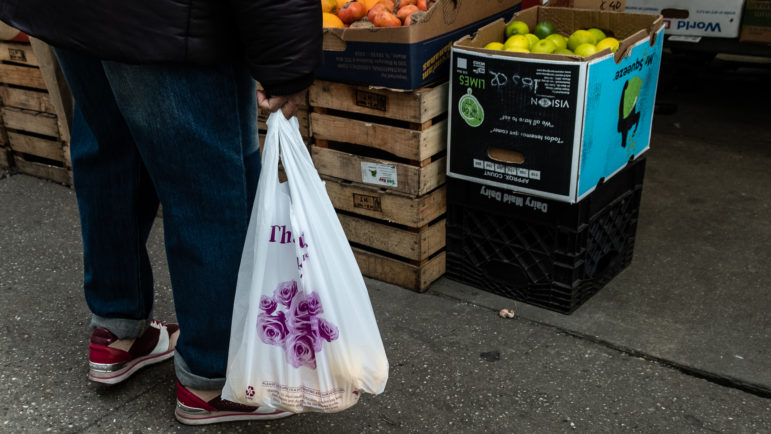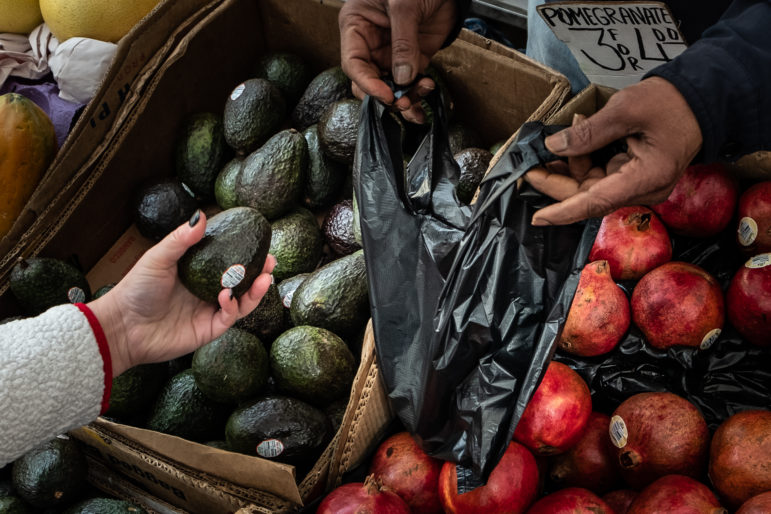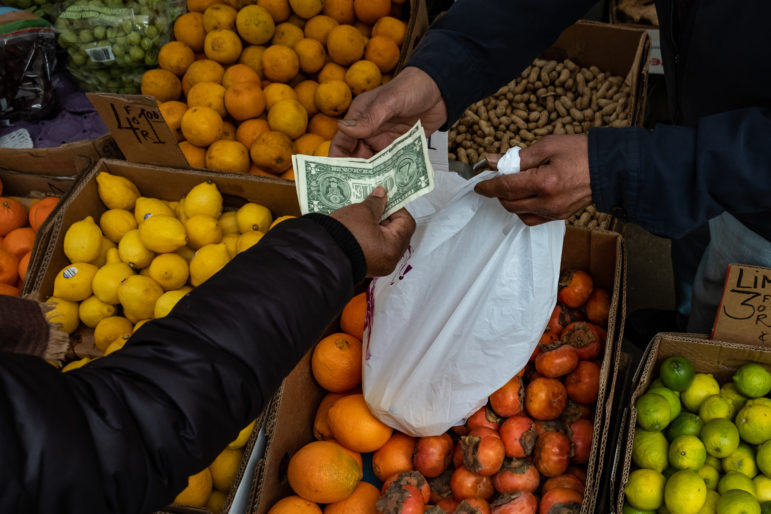The effectiveness of New York’s plastic bag ban could serve as a portend for other, similar bans on single-use plastics either already approved or under discussion at both the city and state legislative levels. To get a better sense of how its implementation is going, City Limits’ CLARIFY interns spoke to more than 50 bodega owners and store workers in the outer boroughs to see if they’re still using plastic, and if so, to tell us why.

Adi Talwar
A shopper holds a plastic bag in The Bronx.This article was produced as part of the CLARIFY internship program, with reporting by Grace Adesanya, Khushba Ahmed, Filomena Baker, Amanda Chen, Ankita Das, Rosalie Flores, Michelle Grullon, Natalia Lashley, Cynthia Leung, Lina Lin, Josette Lombardi, Jeshua Guerrero Lopez, Luke Macwan, Hazel Melendez, Samama Moontaha, Marie Pontius, John Powers, Sierra Williams and Erica Yang. CLARIFY is generously supported by Google News Initiative and The Pinkerton Foundation.
It’s been nearly two years since New York State adopted a ban on plastic bags, and 15 months since the Department of Environmental Conservation (DEC) began imposing fines for violations—an effort initially delayed by a lawsuit and later, the COVID-19 pandemic.
Environmentalists, however, say the agency still isn’t doing enough to ensure that retailers comply. Plastic bags are still a common sight at stores across the five boroughs, and the state has issued fewer than two dozen violation notices since the ban went into effect in October 2020. Many business owners, meanwhile, claim they’re struggling to implement the change, saying they were largely left to their own devices in making the switch.
The law’s effectiveness could serve as a portend for other, similar bans on single-use plastics either already approved or under discussion at both the city and state legislative levels. To get a better sense of how its implementation is going, City Limits’ CLARIFY interns spoke to more than 50 bodega owners and store workers in the outer boroughs to see if they’re still using plastic, and if so, to tell us why.
More than half of those interviewed—about three dozen store owners or staffers—reported that they were still using plastic bags, or a mix of plastic and paper. The student reporters reached out to dozens of businesses, in person and over the telephone, and successfully surveyed 11 store representatives in Queens, 12 in Brooklyn, 13 in The Bronx and 18 in Staten Island. They asked workers if their store was still using plastic bags and a series of questions to understand the challenges in switching to paper bags or customer-provided bags.
Most who were still using plastic bags said it’s because they’re more convenient than paper bags, which rip easily and are more difficult to fill quickly with bulky items. One-third of them said that cost is an issue.
Francisco Marte, founder of the Bodega and Small Business Association of New York, said a box of 400 paper bags can cost a business upwards of $50 to $55, while a box with more than double the number of plastic bags costs about $12. “We are taking that burden,” he said.
Under the law, violators can face penalties starting at $250 for the first offense, and increase to $500 for each subsequent violation. Certain exemptions may apply to bodega owners. For instance, plastic bags are still allowed for wrapping meat, fish or poultry; for foods in bulk (including produce) and for food sliced or prepared to order. The law also allows local municipalities to implement a five-cent charge on paper bags, which the City Council voted to approve in April 2019, while still promoting a “bring your own bag” policy.
“To truly see a reduction in waste, our policy must encourage people to switch to reusable bags, which everyone can do,” City Comptroller Brad Lander, then a Brooklyn council member, said in a statement at that time.
Alexis Goldsmith, an organizer with the nonprofit Beyond Plastics, argues that a switch from plastic to paper bags misses the point.
“The New York State law is not intended for us to replace single-use plastic bags with single-use paper bags,” she said. “The law is intended for people to bring reusable bags, so it’s not intended to put the burden on the store owners.”
But Marte, and several of the staffers we interviewed, noted that many customers stop by bodegas on their way home from work or appointments and haven’t necessarily planned in advance to pick up grocery items. “Most of the people who go to the bodegas, they don’t bring a reusable bag and they refuse to pay or be charged,” he said. He called charging the customers for bags a “bad idea.”
Several businesses reported that they wanted to use up their remaining stock of plastic bags before switching. The DEC recommends that store owners with leftover plastic bags donate them to a local food bank or other nonprofit, but that information may not be getting into the hands of business owners.
In fact, only five of the business representatives interviewed by City Limits said they received educational outreach or assistance from the state about the law. Those who had said the information they received, such as a pamphlet outlining the new rules in English and Spanish, was not particularly helpful.
The DEC has links to outreach materials for retailers to use—such as pamphlets and photos with information about the environmental impact of plastic bags—on its website in English, Spanish and six other languages.
Marte argues that the state needs to better inform the public about how single-use plastics affect the environment and ensure consumers know about the ban so that education does not fall to business owners.
“We are here ready to embrace and to comply with the rules, but we need the government to help us educate the community,” he said.

Adi Talwar
The price of plastic production
The Bag Waste Reduction Law, which effectively prohibits the use of plastic bags for grocery or retail shopping, was adopted as part of the state budget in 2019. Enforcement was set to begin the following March, but the COVID-19 pandemic stalled the rollout.
It was delayed again due to a lawsuit filed by plastic bag manufacturer Poly-Pak Industries, the Bodega and Small Business Association, a Bronx grocery store and two grocery store owners. In the complaint, the defendants called the rule vague and unconstitutional, and alleged that it directly conflicted with another state recycling law. On Aug. 20, 2020, a State Supreme Court judge ruled against the defendants, upholding the ban on plastic bags and giving the DEC the green light to begin enforcing it in mid-October 2020.
Before the law was implemented, New Yorkers were using an estimated 23 billion plastic bags a year, according to the DEC. The state was the third, after California and Hawaii, to ban the distribution of plastic bags. Five additional states have passed such measures since.
New York legislators have taken further measures to limit single-use plastics at the state and local level. In 2019, former Mayor Bill de Blasio signed an executive order banning city agencies from purchasing plastic food-ware. The City Council voted to ban plastic straws—unless specifically requested by the customer—as of November. And in December, Gov. Hochul signed legislation banning hotels from distributing toiletries in plastic bottles after 2025. Another citywide measure to restrict distribution of plastic utensils, napkins and condiments passed in committee in December, but at the last minute, it was pulled from the City Council calendar of the final standing meeting of the session.
About 79 percent of plastic waste ends up in landfills, rivers and oceans where it can remain for hundreds of years, according to the United Nations. Even when the larger plastic products degrade, they remain in oceans in a smaller form, known as microplastics, which are easily ingested by fish and wildlife.
Studies have shown that use of single-use plastics increased during the COVID-19 pandemic, as more people opted for takeout food delivery and online shopping. And a Spanish study recently published in Environmental Pollution found that the level of microplastics in the world’s oceans may be more than previously measured due to limitations in sample collection.
The post-consumer stage only contributes a piece of the environmental impact of these products. Plastic production is an increasing alternative for oil companies as more states, including New York, move away from natural gas in favor of renewable energy. This involves using fracked natural gas in a chemical process in which ethane is separated from the gas and heated in processing facilities known as “cracker plants.” Environmentalists say these plants emit harmful pollution into neighboring communities.
The Environmental Protection Agency, however, has spoken in favor of opening petrochemical facilities to produce plastics in the U.S. In 2019, former EPA Administrator Andrew Wheeler said that American-made plastics would have less of an impact on the environment than reliance on imported plastic products. Wheeler, who previously worked as a coal lobbyist, is currently being considered for a role on the Virginia Governor-elect’s cabinet, prompting more than 150 former EPA employees to pen a letter opposing the appointment, the AP reported last month.
Between 2010 and 2018, the fossil fuel industry had invested $200 billion into 333 new petrochemical facilities, according to the American Chemistry Council. “Most of them are to manufacture plastic,” said Goldsmith. “I think plastic is the fossil fuel industry’s plan B.”

Adi Talwar
Volunteers hunt for offenders
Goldsmith and her colleagues at Beyond Plastics say they’re frustrated with DEC’s slow enforcement of the plastic bag ban, and have taken matters into their own hands.
The organization has been conducting volunteer surveillances of businesses—both grocery and clothing shops—and reporting offenders to the state. A representative shared a spreadsheet of more than 75 offenders, most based in Brooklyn, with City Limits.
One of those volunteers is David Rosenfeld, a former public school science teacher with a master’s degree in environmental science. He said he was excited when the plastic bag ban was passed but has been disheartened to see a lack of enforcement in his neighborhood of Midwood, Brooklyn. He has repeatedly reported local stores for violating the order, even going as far as to mail plastic bags with the store’s logo on them to the DEC and Gov. Kathy Hochul’s office.
“You can go up and down Avenue M where I am here, and you’d be hard pressed to find a store that’s not giving out plastic bags,” Rosenfeld said.
The DEC conducts complaint-based inspections, an official said, and has received hundreds of complaints, most of them in the city. “DEC continues to actively investigate complaints across the state and brought hundreds of outlets into compliance with the Bag Waste Reduction Law,” the official said in a statement. “DEC continues to encourage the public to submit potential violations for investigation and encourage New Yorkers to use reusable bags whenever possible.”
The agency has a dedicated website, email and hotline (518-402-8706) for consumers to anonymously report offenders.
Another volunteer, Judith Weis, said she blames DEC more than the business owners for the overwhelming lack of compliance she sees while visiting stores around the city. Weis, a marine biologist and Rutgers professor, has published papers on the environmental impact of microplastics.
“We’ve got a law and we’ve got an agency that’s supposed to be enforcing the law,” she said. “And when that doesn’t happen and the pollution continues, it makes me angry.”
Weis said she reported Gristedes and D’Agostino, two major city grocery chains, for noncompliance about a year ago. The DEC spokesperson confirmed that the agency has consent orders with those chains, along with two other multi-store companies and several small businesses.
“The response I’ve got [from DEC] was, ‘Oh, we are doing such a good job. We got Gristedes and D’Agostino to comply,’” she said. “Well, that was a year ago, and that’s not enough. We still have hundreds and hundreds of other stores.”
As of January, the DEC had conducted 271 store visits and issued 93 warning notices in New York City and Long Island. “The vast majority of outlets across New York State continue to comply with the law and as complaints are received and verified, DEC works swiftly to bring the facility into compliance,” the spokesperson wrote in an email.
Statewide, the agency has issued 23 violation notices, of which nine were small businesses, while the reminder were chains with multiple locations, the spokesperson said. Statewide, DEC has collected $28,000 in fines related to plastic bag use as of February.
Environmentalists say that figure is too low based on their observations of how frequently the law is not followed.
“That’s really inadequate for a law that’s been on the books for this long, for the size of the state of New York,” said Judith Enck, the president of Beyond Plastics.
Rosenfeld said he would like to see either a stricter enforcement of the rule, which he believes is simply being ignored, with greater consequences or heftier penalties for offenders.
“The choices that we make now in these few years, decades, really are going to affect people,” he said. “That’s a very important part of where we are in history right now.”
Liz Donovan is a Report for America corps member.










5 thoughts on “Plastic Bags Still Ubiquitous in NYC Shops, Months After Enforcement of Ban Began”
Sadly, the lack of enforcement is not only a New York City problem. Many Long Island Stores also are ignoring the law with no consequences. I’ve reported many an theDEC site and to no avail. Maybe you could find out just how many violations have been reported and how each was investigated . Very discouraging.
These ‘environmental protection’ bills are a tax on the poor. Not mentioned here is that most stores, at least in the Bronx, don’t have paper bags and force customers to buy bags for a $1.00. In supermarkets you see people buying 2/3 bags: whatever they saved in food discounts is gone in buying bags. Paper bags don’t come with handle, another inconvenience. Who can carry more than one bag without handle?
Big companies and corporations are NOT paying their share. It’s the poor taxed NOT to protect the environment but for states and cities to pick our pockets. Take the ‘bottle recycle’ law. Per the own city website, it collects MILLIONS of dollars on UNREDEEMED bottles. We pay the tax but there is NO place to redeem the bottles, so we lose that money. Now some groups want to DOUBLE the tax for ‘recycle’ and include almost all containers, including milk.
Stop lying. It’s not the environment you want to protect: it’s the money you take from us you want. Keep picking our pockets. What the heck: we are just a perennial caste for you.
This is absolutely correct. If you can carry two paper bags at once I can see a circus performer career in your future.
And your “poor” that keep buying $1 re-usables and not re-using them should be reclassified as morons.
I always re used my grocery bags as garbage bags. Far a single person household, they were the right size for my needs, as I would fill one before the garbage starts to smell. Without that supply, I end up buying single use garbage bags, which cost much more, use more plastic per bag, and get a lot of waste space because they have to go down before they are full. My budget option of course, is to find a wholesaler and buy the 250 or 500 count box of the old grocery sacks, so I can minimize my plastic use as well as spending.
Agree. That’s what I have to do as well. Bringing my cloth bag for shopping does not solve my need to wrap up up my trash somehow.